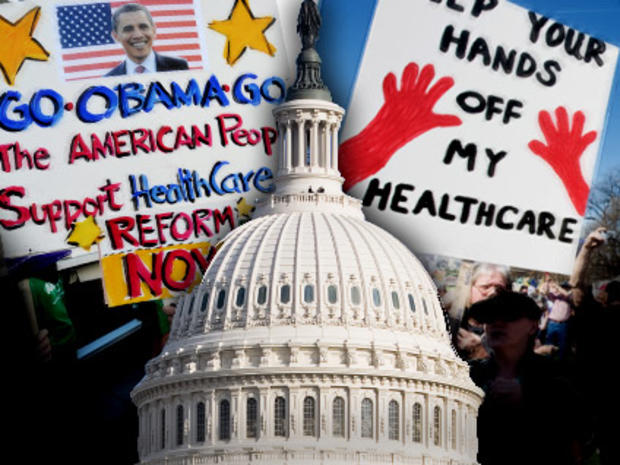White House Fires Back at Ruling Declaring Obama's Health Care Law Unconstitutional, Calls Decision "Judicial Activism"
Senior Obama administration officials told reporters late Monday afternoon that a federal judge's ruling deeming the sweeping health care reform law unconstitutional is "well out of the mainstream of judicial opinion" and predicted it would be overturned on appeal.
The officials laid out their case against the ruling, which is grounded in the argument that the mandate that Americans buy health care insurance or pay a fine, on a conference call. They suggested that judge Roger Vinson decision ignored cases that did not fit his conclusion, that a "good deal of it is built on sort of rhetorical conjecture," and that the judge did allow that the federal government has the right to regulate decisions to buy insurance despite his ultimate conclusion.
"The analysis is on the whole is, to put it charitably, unconventional," said one official. Another said repeatedly that it is an "outlier" that contradicts other rulings.
Their complaint that the decision was built in part on conjecture was related to passages like this: "Or, as discussed during oral argument, Congress could require that people buy and consume broccoli at regular intervals...Not only because the required purchases will positively impact interstate commerce, but also because people who eat healthier tend to be healthier, and are thus more productive and put less of a strain on the health care system."
That passage, one official said, "does not in any way fit with a traditional Commerce Clause analysis." The official added: "It's really frankly, as I can tell, a scare tactic, and it's not one that any lawyer of any ideological inclination would recognize."
Health Reform Unconstitutional, Says Judge: Is He Right? (POLL)
In striking down the law, Vinson found Congress exceeded its authority in passing the law under the Constitution's Commerce Clause. He said it would be a "radical departure" from existing law to give Congress power to order people to buy something, as opposed to merely regulating activity once someone has entered the economic stream.
This is similar to the judge's ruling in an earlier case in Virginia -- except Vinson concluded he couldn't sever the unconstitutional individual mandate provision from the broader law, and so as a result the entire law must fall.
The White House officials said that the ruling would not have an impact on implementation of the law, which is being phased in gradually. (The individual mandate, for example, does not begin until 2014.) They said that states cannot use the ruling as a basis to delay implementation in part because the ruling does not rest on "anything like a conventional Constitutional analysis." Twenty-six states were involved in the lawsuit.
In a blog post on the White House website, Assistant to the President and Deputy Senior Adviser Stephanie Cutter wrote that the case is "is a plain case of judicial overreaching."
"We don't believe this kind of judicial activism will be upheld and we are confident that the Affordable Care Act will ultimately be declared constitutional by the courts," she added.
The Department of Justice released a statement decrying the ruling and announcing plans to appeal. It said it was considering whether it is necessary to seek a stay while the appeal is pending. (Initial analysis suggests that may not be needed because the judge found that the case will wind its way through the appeals process and reach the Supreme Court before the year 2014, when the individual mandate goes into effect.)
"We strongly disagree with the court's ruling today and continue to believe - as other federal courts have found - that the Affordable Care Act is constitutional," it said. "This is one of a number of cases pending before courts around the country, including several that the government has won in the district courts that are now before the courts of appeals. There is clear and well-established legal precedent that Congress acted within its constitutional authority in passing this law and we are confident that we will ultimately prevail on appeal."
Republicans, who campaigned on a promise to repeal the law legislatively, naturally had a far different take.
"Today's decision affirms the view, held by most of the states and a majority of the American people that the federal government should not be in the business of forcing you to buy health insurance and punishing you if you don't," said House Speaker John Boehner, whose chamber has voted to repeal the measure.
Added South Carolina Sen. Jim DeMint, who has organized Senate opposition to the bill: "ObamaCare is clearly unconstitutional, courts continue to rule against it, and Americans sent a clear message in November to repeal it. Today, all Republican senators have united to repeal this government takeover of health care. I will work with other Republicans to have a vote to repeal Obamacare as soon as possible."
Because Democrats control the Senate, there is virtually no chance that the body will pass a repeal bill.

